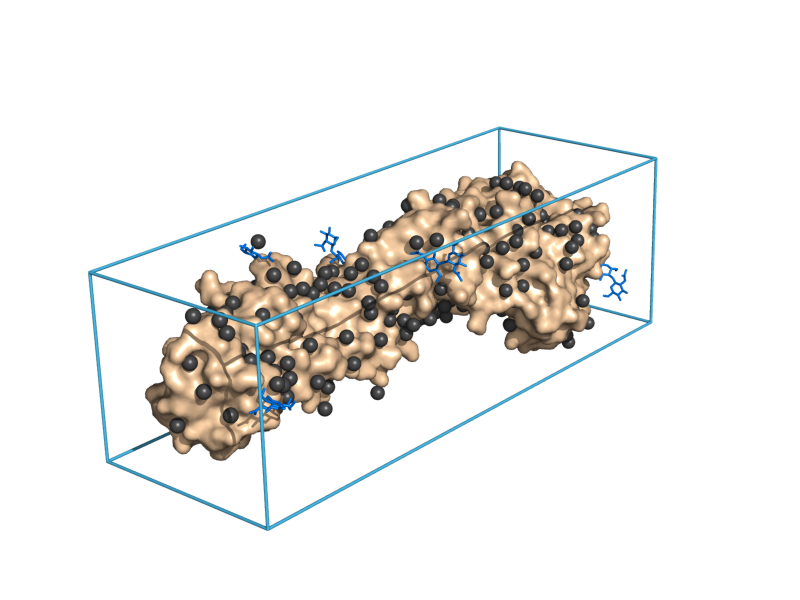This is a read-only mirror of pymolwiki.org
Difference between revisions of "DrawBoundingBox"
Jump to navigation
Jump to search
(Added the padding option and some useful print statements. Change the name to drawBoundingBox, plus some code alterations) |
m (DrawMinBoundingBox moved to DrawBoundingBox: Now it can use padding, so it's not only min.) |
(No difference)
| |
Revision as of 19:09, 30 March 2009
Overview
Draws a bounding box around a given selection.
Example
run ~/drawBoundingBox.py
fetch 1jsd
drawBoundingBox 1jsd, r=0.33, g=0.80
Installation
Just copy the source to your computer. Then run
run /path/to/drawBoundingBox.py
# -*- coding: utf-8 -*-
from pymol.cgo import *
from pymol import cmd
from random import randint
from string import split
#############################################################################
#
# drawBoundingBox.py -- Draws a box surrounding a selection
#
#
# AUTHOR: Jason Vertrees
# DATE : 2/20/2009
# NOTES : See comments below.
#
#############################################################################
def drawBoundingBox(selection="(all)", padding=0.0, linewidth=2.0, r=1.0, g=1.0, b=1.0):
"""
DESCRIPTION
Given selection, draw the bounding box around it.
USAGE:
drawBoundingBox [selection, [padding, [linewidth, [r, [g, b]]]]]
PARAMETERS:
selection, the selection to enboxen. :-)
defaults to (all)
padding, defaults to 0
linewidth, width of box lines
defaults to 2.0
r, red color component, valid range is [0.0, 1.0]
defaults to 1.0
g, green color component, valid range is [0.0, 1.0]
defaults to 1.0
b, blue color component, valid range is [0.0, 1.0]
defaults to 1.0
RETURNS
string, the name of the CGO box
NOTES
* This function creates a randomly named CGO box that minimally spans the protein. The
user can specify the width of the lines, the padding and also the color.
"""
([minX, minY, minZ],[maxX, maxY, maxZ]) = cmd.get_extent(sel)
print "Box dimensions (%.2f, %.2f, %.2f)" % (maxX-minX, maxY-minY, maxZ-minZ)
minX = minX - float(padding)
minY = minY - float(padding)
minZ = minZ - float(padding)
maxX = maxX + float(padding)
maxY = maxY + float(padding)
maxZ = maxZ + float(padding)
if padding != 0:
print "Box dimensions + padding (%.2f, %.2f, %.2f)" % (maxX-minX, maxY-minY, maxZ-minZ)
boundingBox = [
LINEWIDTH, float(linewidth),
BEGIN, LINES,
COLOR, float(r), float(g), float(b),
VERTEX, minX, minY, minZ, #1
VERTEX, minX, minY, maxZ, #2
VERTEX, minX, maxY, minZ, #3
VERTEX, minX, maxY, maxZ, #4
VERTEX, maxX, minY, minZ, #5
VERTEX, maxX, minY, maxZ, #6
VERTEX, maxX, maxY, minZ, #7
VERTEX, maxX, maxY, maxZ, #8
VERTEX, minX, minY, minZ, #1
VERTEX, maxX, minY, minZ, #5
VERTEX, minX, maxY, minZ, #3
VERTEX, maxX, maxY, minZ, #7
VERTEX, minX, maxY, maxZ, #4
VERTEX, maxX, maxY, maxZ, #8
VERTEX, minX, minY, maxZ, #2
VERTEX, maxX, minY, maxZ, #6
VERTEX, minX, minY, minZ, #1
VERTEX, minX, maxY, minZ, #3
VERTEX, maxX, minY, minZ, #5
VERTEX, maxX, maxY, minZ, #7
VERTEX, minX, minY, maxZ, #2
VERTEX, minX, maxY, maxZ, #4
VERTEX, maxX, minY, maxZ, #6
VERTEX, maxX, maxY, maxZ, #8
END
]
boxName = "box_" + str(randint(0,10000))
while boxName in cmd.get_names():
boxName = "box_" + str(randint(0,10000))
cmd.load_cgo(boundingBox,boxName)
return boxName
